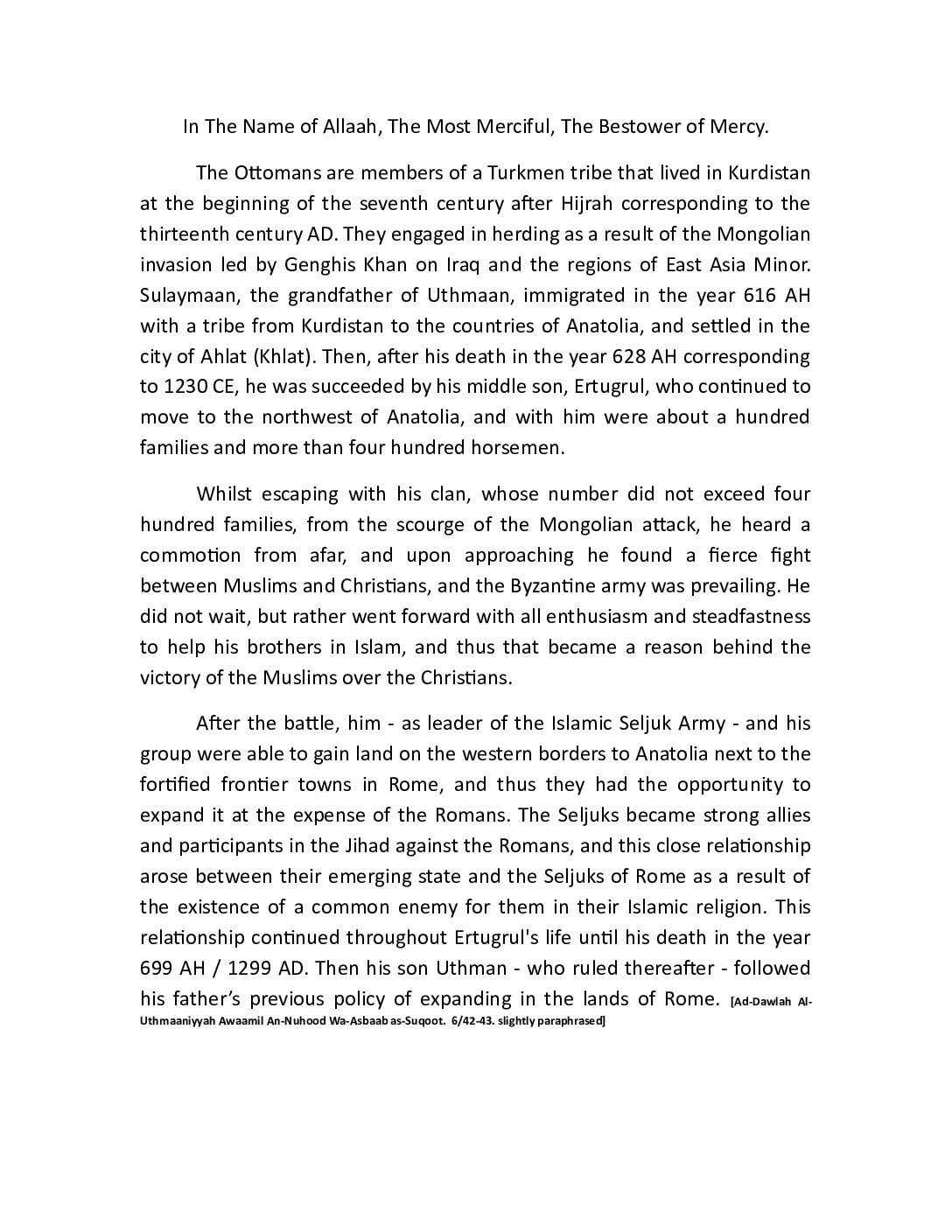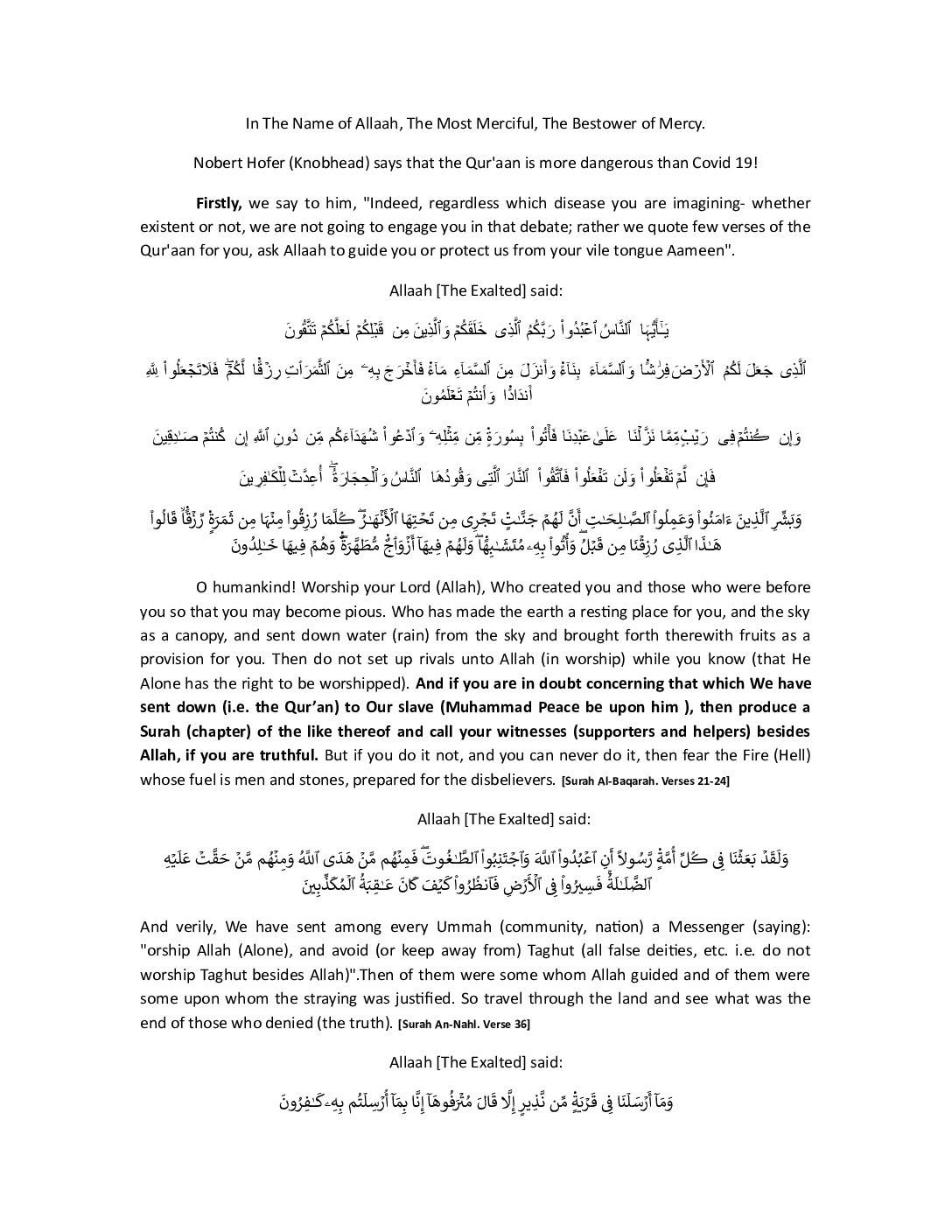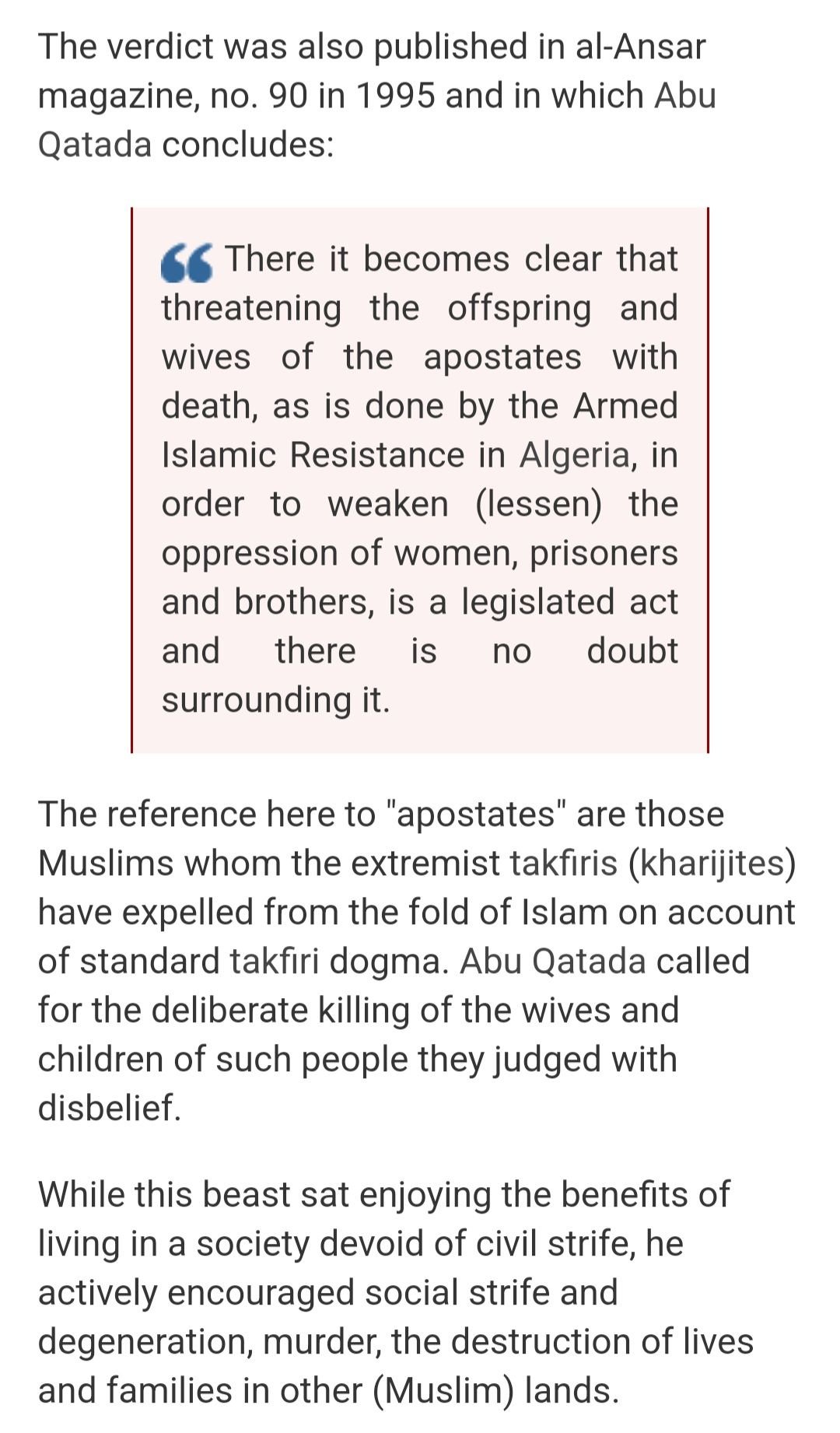In The Name of Allaah, The Most Merciful, The Bestower of Mercy
Reader: In this discourse, Dr Shaikh Abdullah Al-Bukhaari (may Allaah preserve him) will indicate to another goal behind boycotting through the texts of the Qur’aan, the Sunnah and the statements of the scholars, which Dr Ibraaheem Ar-Ruhayli (may Allaah rectify his affair or protect us from his false views) failed to mention in his defective and deficient advice to Ahlus Sunnah.
Likewise, not only will the texts of the Sharee’ah and the statements of the scholars utilised by the Shaikh (Dr Abdullah Al-Bukhaari) manifest the fact that the Hizbiyyoon propagate a corrupt Walaa Wal Baraa related to the affair of some of the Mubtadi’ah, but they will also unveil the deception of some of those hizbiyyoon of Luton (sponsees of Ihyaa Turaath) who have recently attempted to deceive the people through the statement [Whatever leads to hatred and enmity between the people, then verily the legislation categorically prohibits it]. However, this has to be understood in the light of what you will discover from the detailed texts of the Sharee’ah and the understanding of the Imaams of the Sunnah.
Finally, the reader should not be oblivious of the fact that Dr Ibraaheem Ar-Ruhayli claimed that the aims (or goals) behind boycotting are for the purposed of achieving three affairs only and that his claim is supported by the A’immah Al-Muhaqqiqoon, even though he did not quote except Shaikhul Islaam Ibn Taymiyyah (rahimahullaah). As for Dr Shaikh Abdullaah Al-Bukhaari, not only did he nullify this above unsubstantiated claim-by the Tawfeeq of Allaah- but he also pointed out that Dr Ibraaheem did not provide statements from those A’immah Al-Muhaqqiqoon, whom he claims backed his views. In Part A of this series [see here https://t.co/fW6kmUrpSi ] we saw that Dr Shaikh Abdullah fulfilled the trust in this affair of knowledge by quoting the Imaams and in Part B to follow-InShaa’Allaah- he quoted the scholars, such as Sufyaan Ath-Thawri, Ash-Shawkaani, Abu Daawud, Al-Baghawiy, Al-Mundhiriy, Al-Bayhaqqi, An-Nawawi, As-Saabooniy, Ibn Aqeel, Sulaymaan Ibn Sahmaan and Shaikhul Islaam Ibn Taymiyyah (rahimahumullaah). Likewise, the reader should not forget that Dr Shaikh Abdullaah’s observations on Dr Ibraaheem’s defective and deficient advice to Ahlus Sunnah was examined by a number of scholars in our era, such as Shaikh Rabee, Shaikh Zayd (rahimahullaah), Shaikh Muhammad Bin Haadi, Shaikh Ubaid, Shaikh Ali Naasir, Shaikh Muhammad Baazmool and others.
To proceed:
Dr Shaikh Abdullaah Al-Bukhaari (may Allaah preserve him) began this discussion, saying that a second goal (or aim) behind boycotting is to fulfil the belief in Loyalty and disassociation; love for the sake of Allaah and hatred for the sake of Allaah because a believer is commanded with it. The actualization of this great principle necessitates disassociating oneself from bidah and the innovators because the strongest bond of Imaan is to love for the sake of Allaah and hate for the sake of Allaah.
The texts of the Qur’aan and (authentic) Sunnah indicate to the fact that it is obligatory to establish this creed (concerning love and hatred for the sake of Allaah) and this is what the Salafus Saaleh (pious predecessors) of this Ummah understood; so they determined its texts and applied it through actions. And that which indicates to this aim (or goal) is as follows:
Allaah (The Most High) said:
يَا أَيُّهَا الَّذِينَ آمَنُوا لَا تَتَّخِذُوا الَّذِينَ اتَّخَذُوا دِينَكُمْ هُزُوًا وَلَعِبًا مِّنَ الَّذِينَ أُوتُوا الْكِتَابَ مِن قَبْلِكُمْ وَالْكُفَّارَ أَوْلِيَاءَ ۚ وَاتَّقُوا اللَّهَ إِن كُنتُم مُّؤْمِنِينَ
O you who believe! Take not for Auliya’ (protectors and helpers) those who take your religion for a mockery and fun from among those who received the Scripture before you, nor from among the disbelievers; and fear Allah if you indeed are true believers. [5:57]
Then Shaikh Abdullaah Al-Bukhaari quoted Imaam Ash-Shawkaani (rahimahullaah) who stated in Fat’hul Qadeer 2/54 that the above ayah prohibits one from taking as helpers (or protectors) those who take the religion for mockery and fun. This includes everyone who does this, be it the polytheists, the people of the Book, and the people of bidah who ascribe themselves to Islaam. The part of the ayah [مِّنَ الَّذِينَ أُوتُوا الْكِتَابَ -among those who received the Scripture] does not negate the inclusion of other people besides them (i.e. those were given the scripture), if the stated cause (i.e. taking religion for mockery and fun) in the ayah is present, which is the very reason behind the prohibition. [End]
The scholars have given attention to the establishment of this aim (or goal behind boycotting) by placing chapter headings (in their books) and stated what indicates to it. Imaam Abu Daawud placed a chapter in his Sunan (i.e. Sunan Abu Daawud) titled, ‘’Chapter: keeping away from the people of desires and having hatred for them.’’ [Vol 5, page 6]
Al-Haafidh Al-Baghawi placed a chapter titled, ‘’Keeping away from the people of desires’’ [1/221]
Al-Haafidh Al-Mundhiriy placed a chapter in [At-Targheeb Wat-Tarheeb 4/8] which he called: [At-Targheeb Fil Hubbi Fil-laahi Ta’aalaa – An urge (i,e. through texts of the sharee’ah about having love for the sake of Allaah (The Most High); Wat-Tarheeb Min Hubbil Ash’raar Wa Alil Bidah (i.e. made to fear by way of warning through the sharee’ah texts that) the evil ones and ahlul bidah should not be loved; Li-annal Mar’a Ma’a Man Ahabba (i.e. because a person will be with the one he loves] [End]
Al-Bayhaqqi placed a chapter in Al-I’tiqaad’ page 236 titled: [’Prohibition against sitting with Ahlul Bidah] [End]
An-Nawawi placed a titled in Riyaadus Saaliheen’ page 551, Chapter: [The Prohibition against boycotting between two Muslims beyond three days, except in case of boycotting (a person) due to Bidah, or (one) who openly commits wicked deeds or what is similar] [End]
Imaam As-Saabooniy stated in Aqeedatus Salaf Ashaab Al-Hadeeth’ page 292: And they hate Ahul-Bid’ah (the People of Innovation) who innovate into the religion that which is not from it. They neither love them nor keep company with them; they neither listen to their speech nor sit with them; they neither argue with them about the religion nor debate with them. Rather, they guard their ears from hearing their falsehood, which if they pass through the ears and settle in the hearts, will cause harm (to the hearts); bring about devilish whisperings and corrupt ideas. And regarding this, Allaah [The Mighty and Majestic] sent down:
وَإِذَا رَأَيْتَ الَّذِينَ يَخُوضُونَ فِي آيَاتِنَا فَأَعْرِضْ عَنْهُمْ حَتَّىٰ يَخُوضُوا فِي حَدِيثٍ غَيْرِهِ
And when you (Muhammad) see those who engage in a false conversation about Our Verses (of the Qur’an), stay away from them till they turn to another topic. [6:68] [End]
Imaam Adh-Dhahabi stated in the biography of Thawr Bin Yazeed Al-Himsiy (died 153) that Abu Tawbah Al-Halabiy said: ‘’Our companions related to us that Thawr met Al-Awzaa’ee, so he (Thawr) extended his hand (i.e. to shake Al-Awzaa’ee’s hand), but Al-Awzaa’ee refused to give his hand to him and said: O Thawr! If this was to due to an (affair of) the Dunyah, then there would have been closeness, but it is an (affair) of the religion.’’ The reason behind Imaam Al-Awzaa’ee turning away from Thawr was because Thawr used to subscribe to the Qadari views. [See Siyar A’laam Nubulaa 6/344 and Meezaan Al-I’tidaal’ 1/374] [End]
Ibn Aqeel said: If you want to know the state of Islaam in the midst of the people of the era, then neither look at their crowding at the doors of the grand mosques nor the raising of their voices with the (statement) Labbaik (i.e. the Talbiyah); rather look at their interaction with the enemies of the Sharee’ah. [Al-Aadaab Ash-Sharee’ah’ of Ibn Muflih 1/268] [End]
Then in the second paragraph on page 65, Shaikh Abdullaah Al-Bukhaari quoted a statement of Al-Allaamah Ash-Shaikh Sulaymaan Ibn Sahmaan regarding the affair that to refrain from giving Salaam to a person or replying to Salaam does not necessitate that such a person is outside the fold of Islaam, as some people claim that one can neither refrain from giving Salaam nor refrain from replying to the salaam, except if such a person has no Islaam! So are those who hold this view not aware that refraining from giving Salaam or replying to it is from the Sunnah of the Messenger (sallal-laahu-alayhi-wasallam)- the one whose Sunnah is a source of guidance for those who are guided and those who abandon it are misguided; for indeed the Messenger (sallal-laahu-alayhi-wasallam) boycotted Ka’ab Ibn Maalik and his two companions when they failed to participate in the battle of Tabuk, even though they were amongst those who participated in the Battle of Badr.
Therefore, do those ones (i.e. the ones who claim that refraining from giving Salaam or replying to salaam is not to be applied except to one who has no Islaam) think that it was ascertained that Ka’ab and his two companions had no Islaam when the Messenger (sallal-laahu-alayhi-wasallam) boycotted them by neither giving them salaam nor speaking to them? If that is not the case- even though they were virtuous people- then indeed he (sallal-laahu-alayhi-wasallam) boycotted them, neither gave them salaam nor spoke to them when they committed (that blameworthy affair) which obligated that they were to be reprimanded and disciplined until Allaah showed them mercy, after they repented, turned in repentance and in obedience with true Faith.
So when this becomes clear to you, then you will know the ignorance of these ones (i.e. those who say that there is neither refraining from giving salaam to a Muslim nor replying to his salaam, except if he has no Islaam) regarding the Sunnah and the statements of the scholars. You should know that we do not refrain from giving them Salaam (i.e. to some of the people who deserve such treatment) except due to what they have innovated in the religion; speaking ill of the scholars and allying with the enemies of the sharee’ah, such as the Raafidah and those similar to them, and due to the evil deeds and statements they have brought about. [End]
Then Dr Shaikh Abdullah Al-Bukhaari stated on page 69 that there are those who claim that there should be softness and leniency (i.e. a claim to softness in its wrong place) which leads to negligence regarding this great fundamental and upright principle; so you find him showing a display of softness and leniency, and making claims of love for the sake of Allaah. It maybe that this person and his ilk are truthful in their claims of loving for the sake of Allaah, but when the affair is examined in reality, they do not hate for the sake of Allaah- meaning that he has love for the sake of Allaah but not hatred for the sake of Allaah (in this affair). So in that regard, he has not actualised this great principle in the manner it deserves to be actualised, for indeed love and hate for the sake of Allaah are two affairs that necessitate each another and are binded to one another- one cannot be separated from the other. Abu Nu’aym stated in Al-Hilya 7/24 that Yoosuf Ibn Asbaat said: I heard Sufyaan Ath-Thawriy saying: ‘‘If you love a man for the sake of Allaah, but then he innovated an innovation in Islaam and you do not hate him due to it, then indeed you did not love him for the sake of Allaah.’’ [End]
Then on page 71, Shaikh Abdullaah al-Bukhaari stated that a person should be careful of the games of shaytaan-be it a shaytaan amongst humans or the Jinn- with regards to these claims; so a person should cling to the texts of the sharee’ah and the understanding of the Salafus Saaleh because the entire Sharee’ah is goodness, mercy, compassion, justice and equity (i.e. within the boundaries legislated by the All-Wise Creator). And it is from justice, equity, compassion and mercy for the slave (i.e. for everyone) that he actualises Allaah’s Sharee’ah. [End]
Shaikhul Islaam Ibn Taymiyyah said: All the legislated punishments of the Sharee’ah are a beneficial remedy by way of which Allaah rectifies the disease of the hearts, and they are from Allaah’s Mercy to His slaves and compassion for them- all of which enters into the statement of Allaah (The Blessed and Most High):
وَمَا أَرْسَلْنَاكَ إِلَّا رَحْمَةً لِّلْعَالَمِينَ
And We have sent you (O Muhammad) not but as a mercy for the ‘Alamin (mankind, jinns and all that exists). [21:107]
So whoever abandons this beneficial mercy due to compassion for a sick person, then he has helped such a person to be subjected to punishment and destruction, even though he does not desire except good. (And in doing so) he is an ignoramus and an idiot, just as some ignorant women and men behave with their sick ones; those whom they nurture; their slaves and other than them by not disciplining and punishing them for the shirk they commit and preventing them from good due to compassion; so that leads them to corruption, transgression and destruction. [End] [Majmoo 15/290] [Ref 1]
To be continued In-Shaa-Allaah
———————————————————————————————————————-
[Ref 1] Question to Imaam Abdul Azeez Bin Baaz (Rahimahullaah): Is enjoining Ma’ruf and forbidding Munkar, namely correcting the wrong by the hand, a right for all Muslims or is it just confined to those in authority and their deputies?
A: Correcting the wrong is a right for all Muslims according to their ability, because the Messenger (peace be upon him) said, “Anyone of you who sees Munkar (that which is unacceptable or disapproved of by Islamic law and Muslims of sound intellect), let them change it with their hand (by taking action); if they cannot, then with their tongue (by speaking out); and if they cannot, then with their heart (by hating it and feeling that it is wrong); and that is the weakest of Iman (faith).”(Muslim, Abu Dawood, Tirmidhi & others)
However, changing by the hand must be based on ability that will not result in greater corruption or evil. Man has the right to rectify matters with his hand (by taking action) in his home, with his children, wife, and servants; and a manager has the authority to make changes with the hand within the organization they are responsible for, in accordance with the instructions that were given to them. Otherwise, people should not change with their hand anything they are not authorized to change. If they do make changes in matters that they have no authority over, this will result in more evil and great corruption between them and the people and between the people and the state.
In this case they should make the change with their tongue (by speaking out). They may say: “O so-and-so! Fear Allah! That is not permissible,” “This is Haram (prohibited),” or: “That is Wajib (obligatory) on you,” and clarify it with Shar’iy (Islamic legal) evidence. This is what can be done by the tongue. As for changing matters with the hand, this should be done where one has authority, such as one’s home, with those under one’s responsibility, or those authorized by the ruler, such as organizations given permission and authority to enjoin Ma’ruf (that which is judged as good, beneficial, or fitting by Islamic law and Muslims of sound intellect). They should make changes in accordance to the degree of authority that has been given to them, in the way prescribed by the Shari’ah (Islamic law), without exceeding their jurisdiction. The same applies to the governor of a city; he should make changes with his hand, in accordance with the instructions he has.
http://www.salafitalk.net/st/viewmessages.cfm?Forum=16&Topic=9751
[Ref 2: At-Ta’aqqubaat As-Sareehah Alaa Risaalah An-Naseehah Lid-Duktoor Ibraaheem Bin Aamir Ar’Rihayli’ pages …61-72 Abridged and paraphrased]










